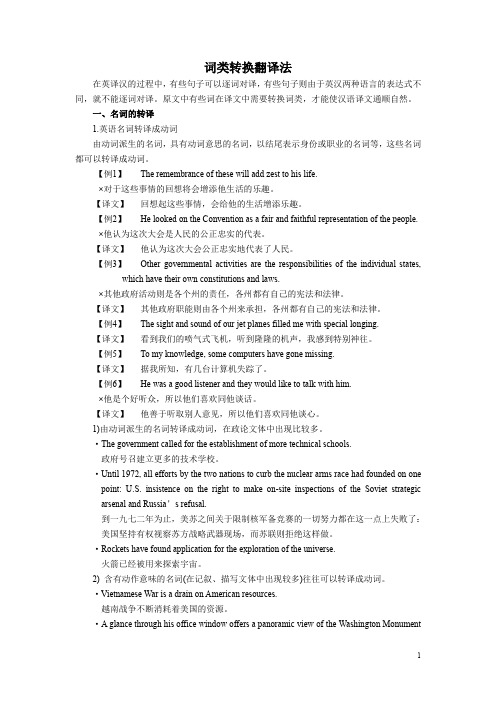词类转译法
词类转换译法

英语中许多名词, 动词含义灵活, 翻译时需要从其基本 意义出发, 联系上下文加以灵活处理。
通常情况下, 由动词派生的名词和具有动作意义或含 有动作意味的名词往往可以转译成汉语动词; 由形容 词派生的名词和一些加不定冠词作表语用的名词往往 可以转译成形容词。有些意义抽象的名词或名词短语 与句子其他成分之间存在一定的逻辑关系时, 可以根 据其意义转译成汉语副词或相应的状语成分。
give no evidence of 不足以说明 keep watch over 密切注视 have an effect on 影响 put on an imitation 模仿
2. prep. + objective + prep. in answer to 响应
on account of 基于…的原因 in proportion to 与…成比例 He has already made mention of the matter in
那天交好运的渔夫们都已回来 。
What film will be on this evening?
今晚放映什么影片?
That book will be out pretty soon.
那本书不久就要出版了。
In those years the republicans were in.
那些年是共和党执政。
Up the street they went, past stores, across a broad square, and then entered a huge building.
他们沿着大街走去, 经过许多商店, 穿过一 个大广场, 然后进入了一座大厦.
3 形容词转译成动词
英语中表示知觉、情欲、欲望等心理状 态的形容词,在系动词后作表语用时, 往往可转译成动词。如:confident, certain, careful, cautious, angry, sure, ignorant, afraid, doubtful, aware, concerned, glad, delighted, sorry, ashamed, thankful, anxious,grateful, able, content, suspicious, resentful等。
词类转换译法

International trade is the exchange of goods and services produced in one country for goods and services produced in another.
国际贸易就是一个国家生产的商品和提供的 服务与另一个国家生产的商品和服务进行交 换。
3. 英语中有些加后缀-er的名词,如teacher 教师,thinker思想家等等,有时在句中并 不指其身份和职业,而是含有较强的动作 意味,在汉语中没有恰当的对应名词时, 往往可以译成动词。
指职业的时候只能译成名词。e.g.
She is a well-known singer.
He is the best singer of this song in our class.
He started at a walk but soon broke into a run.
他开始时慢慢走着,但一会儿就奔跑起来。
The film took my thoughts back to the days in London.
影片使我回想起在伦敦的日子。 beyond thought 想象不到 after much thought 经仔细考虑后
give no evidence of 不足以说明 keep watch over 密切注视 have an effect on 影响 put on an imitation 模仿
2. prep. + objective + prep. in answer to 响应
on account of 基于…的原因 in proportion to 与…成比例 He has already made mention of the matter in
词类转译法

词类转译法(转译为动词) 词类转译法(转译为动词)
…Tom looked his good-bye at the Tom goodgarden. garden 汤姆看了看园子,跟它告别。 He cast a disdainful glance at the prisoner. 他轻蔑地瞄了一眼那个囚犯。 She gives me a joyous grin. 她开心地对我笑了笑。
词类转译法(转译为动词) 词类转译法(转译为动词)
Doctors have said that they are not sure they can save his life. 不敢肯定… Saud was a frustrated man at that time. 沙德那时已受挫折。 I was grateful to John for bringing the books. 非常感谢约翰… The student is not content with his progress.
词类转译法(转译为动词) 词类转译法(转译为动词)
… believed,a successful ban of the trade in opium must be preceded by the destruction of the drug itself. …认为,要成功禁止鸦片买卖,必须得先 把鸦片销毁。 Deng Xiaoping at the 11th Party Congress said,there must be less empty talk and more hard work. 邓小平在“十一大”上说,必须要少说 邓小平在“十一大”上说,必须要少说空 工作。 话,多做工作。
翻译理论与实践
词类转译法 conversion
课件:转换译法

• 二、 名词可转译成动词 • ① 含有动作意味的名词往往可以转译成动
词。
• Every morning she would go to the lake area for a walk.
• 四、形容词转译成名词 • ① 有些形容词加上定冠词表示某一类人,
汉译时常译成名词。
• They did their best to help the poor. • 他们尽最大努力帮助穷人。 • ② 由名词派生的形容词可转译成名词。
• The Wilde family were religious. • 王尔德全家都是虔诚的教徒。
如characterize, symbolize, design, cost, behave等, 这些动词在英语中用得很普遍,但是翻译成汉语 时却很难找到与之对等的词因此,译成汉语时, 常常转译为名词。
• Such materials are characterized by good insulation (绝缘) and high resistance to wear.
• The government called for the establishment of more technical schools.
• My suggestion is that he should quit smoking at once.
• Millions of people in the mountains areas are finally off poverty.
• 每天早上,她都要到湖区去散步。
• The operation of a computer needs some knowledge of English.
词类转换翻译法

词类转换翻译法在英译汉的过程中,有些句子可以逐词对译,有些句子则由于英汉两种语言的表达式不同,就不能逐词对译。
原文中有些词在译文中需要转换词类,才能使汉语译文通顺自然。
一、名词的转译1.英语名词转译成动词由动词派生的名词,具有动词意思的名词,以结尾表示身份或职业的名词等,这些名词都可以转译成动词。
【例1】The remembrance of these will add zest to his life.×对于这些事情的回想将会增添他生活的乐趣。
【译文】回想起这些事情,会给他的生活增添乐趣。
【例2】He looked on the Convention as a fair and faithful representation of the people.×他认为这次大会是人民的公正忠实的代表。
【译文】他认为这次大会公正忠实地代表了人民。
【例3】Other governmental activities are the responsibilities of the individual states, which have their own constitutions and laws.×其他政府活动则是各个州的责任,各州都有自己的宪法和法律。
【译文】其他政府职能则由各个州来承担,各州都有自己的宪法和法律。
【例4】The sight and sound of our jet planes filled me with special longing.【译文】看到我们的喷气式飞机,听到隆隆的机声,我感到特别神往。
【例5】To my knowledge, some computers have gone missing.【译文】据我所知,有几台计算机失踪了。
【例6】He was a good listener and they would like to talk with him.×他是个好听众,所以他们喜欢同他谈话。
实用翻译技巧:词类转换法

❖3. 副词---名词 ❖It is officially announced that the
unemployment rate will get lower next year.
官方宣称明年失业率将有所降低。
❖Psychologically and culturally, it is difficult and sometimes threatening to look too closely at failure.
我们仔细研究了这种收入高低即为社 会尺度/标尺的观点。
Hale Waihona Puke ❖2. 名词---副词 ❖I have the honor to inform you that
your application has been accepted.
我荣幸地通知阁下,您的申请已被 接受。
❖四、非形容词转形容词 ❖1. 副词---形容词 ❖Not surprisingly, the rush of
arises because a country’s residents want to buy foreign goods.
外汇需求的产生是因为一个国家的居民 想购买外国商品。
❖The products of our factory are chiefly characterized by their fine workmanship and durability.
❖2. 形容词---动词 ❖These occurrences are normal,
within specifications, and are not indicative of defects in products.
第5章英汉翻译中的词类转换法

析: 形容词翻译成汉语中的动词的现象是不多见的, 另外,英语形容词往往需要和系动词be相搭配才可以被 转换成汉语中的动词。因此,严格地说,是英语中的 “be+形容词”的系表结构可以被转换成汉语中的动词。 本例中原文are rich in被翻译成汉语中的动词结构“拥 有大量的…”即是典型的例子。
1.具备动态概念的名词转译成动词
The sight of the boy reminds me of this passed father.
看到那个男孩,使我想起来他已故的父亲。 The love of parents for their children is perfect
and minute. 父母爱其子是无微不至的。 An acquaintance of world history is helpful to
译文:他眼角的余光还能瞥见窗外的景色。 这里是工业区,此刻一片萧条景象。
析: 这里将industrial翻译成“工业区”, 将sad翻译成“一片萧条景象”立即使飘忽 不定的东西变得具有可感性。
3. 形容词转译成名词
The voyage was a smooth one. The wind is favorable and the weather fair.
3. 形容词转译成名词
Stevenson was eloquent and elegant but soft. 史蒂文森有口才,有风度,但很软弱。 They were considered insincere. 他们被人认为是伪君子。
4. 名词转译成形容词
The pallor of her face indicated clearly how she was feeling at the moment.
翻译技巧汇总 词类转译法

7
课堂练习
• 1.He who is subject to temptations tends to err. 2 Talking with his son, the old man was the forgiver of the young man's past wrong doings. 3 He had never been a medical student, yet he was given one of those rare honorary degrees of Doctor of Science.
8
课堂练习参考译文:
• 1.He who is subject to temptations tends to err. 不能抗拒诱惑的人往往要犯错误。 • 2 Talking with his son, the old man was the forgiver of the young man's past wrong doings. 老人在同儿子谈话时宽恕了年轻人过去的种种劣迹。 • 3 He had never been a medical student, yet he was given one of those rare honorary degrees of Doctor of Science 他从来没有上过医学院,但他却获得了理学博士这样难得 的荣誉学位
13
英语名词译成汉语动词时,修饰该名词的形容词往 往转译成汉语副词 • Below 4°C, water is in continuous expansion instead of continuous contraction. • 水在4摄氏度以下就不断地膨胀,而不是不断地收 缩。 • Only when we study their properties can we make better use of the materials. • 只有研究这些材料的特性才能更好地利用它们。
- 1、下载文档前请自行甄别文档内容的完整性,平台不提供额外的编辑、内容补充、找答案等附加服务。
- 2、"仅部分预览"的文档,不可在线预览部分如存在完整性等问题,可反馈申请退款(可完整预览的文档不适用该条件!)。
- 3、如文档侵犯您的权益,请联系客服反馈,我们会尽快为您处理(人工客服工作时间:9:00-18:30)。
• 1. This store features round-the-clock service. • 这家商店的特点是昼夜服务。 这家商店的特点是昼夜服务。 特点是昼夜服务 • 2. Your work is characterized by lack of attention to detail. • 你工作的毛病是粗心大意。 你工作的毛病是粗心大意。 毛病是粗心大意
三. 形容词可以转译成动词
• 1.很多信息 • 会上透露了很多信息。 会上透露了很多信息。 • 2. The manager is grateful to the customers for their valuable suggestions. • 经理感谢顾客们提出的宝贵意见。 感谢顾客们提出的宝贵意见 经理感谢顾客们提出的宝贵意见。 • 3. Animals become indifferent to their young as soon as their young can look after themselves. • 一旦它们的后代能够自己照料自己, 一旦它们的后代能够自己照料自己,它们就 不管了 不管了。
• • • • • • •
二. 介词转译成动词 1. He went to the shop for a bottle of wine. 他去小店买了一瓶酒。 他去小店买了一瓶酒。 2. At noon, she came home for lunch. 中午,她回家吃午饭。 中午,她回家吃午饭。 3. He came to me with a luggage. 拿着行李向我走来 行李向我走来。 他拿着行李向我走来。
• 3、 含有动作意味的名词可转译成动词 、 • 1. Vietnamese War is a drain on American resources. • 越南战争不断地消耗美国的资源。 消耗美国的资源 越南战争不断地消耗美国的资源。 • 2. In fact, the abuse of drugs has become one of America’s most serious social problems. • 事实上,滥用毒品已经成为美国最为严重的 事实上,滥用毒品已经成为美国最为严重的 社会问题之一。 社会问题之一。 • 3. He is an ardent lover of classical music. • 他酷爱古典音乐。 酷爱古典音乐 古典音乐。
1. 无论什么事,只要他一露面,就算成功了。 无论什么事,只要他一露面 就算成功了。 露面, 2. 那天交好运的渔夫们都已回来。 那天交好运的渔夫们都已回来 回来。 3. 国与国之间不同的社会制度不应该妨碍彼此的 国与国之间不同的社会制度不应该妨碍 妨碍彼此的 合作。 合作。
转译成名词
一:动词转译成名词 • 英语中好很多由名词派生出来的动词,以及由名词转 英语中好很多由名词派生出来的动词, 用的动词,在汉语中往往不易找到相应的动词, 用的动词,在汉语中往往不易找到相应的动词,这时 可将其转译成汉语名词。 可将其转译成汉语名词。
三:副词转译成名词 • 由名词派生出来的副词,如译成汉语时很难找到 由名词派生出来的副词, 对应词,而酌情将其译成名词。 对应词,而酌情将其译成名词。 • 1. Originally Ingrid Bergman was from Sweden. • 英格丽.褒曼的 是瑞典。 英格丽 褒曼的原籍是瑞典。 • 2. He is strong physically, but weak mentally. • 很强, 很弱。 他体力很强,可智力很弱。
Translate the following sentences: • 1. His very appearance at any affair proclaims it a triumph. • 2. The successful fishermen of that day were already in. • 3. Difference between the social systems of states shall not be an obstacle to their cooperation.
转译为副词
• 一、名词转译为副词 • They were sitting on a bank and talking of the universe. • 他们坐在河岸边,高谈阔论地谈着。 他们坐在河岸边,高谈阔论地谈着 谈着。 • We set out in great haste for Venice. • 我们匆匆忙忙 地动身来到威尼斯。 我们匆匆忙忙 地动身来到威尼斯。 • When he catches a glimpse of a potential antagonist, his instinct is to win him over with charm and humor. • 只要是一发现有可能反对他的人,他就本能 只要是一发现有可能反对他的人,他就本能 要用自己的魅力和幽默将这个人争取过来。 地要用自己的魅力和幽默将这个人争取过来。
词类的转译 Conversion
• 一、转译为动词
• 在英语句子中只用一个谓语动词,而在汉语中却 在英语句子中只用一个谓语动词, 可以几个动词或动词性结构连用。 可以几个动词或动词性结构连用。如:He admires the President’s stated decision to fight for the job. • ( 他对总统声明为保持其职位而决心奋斗表示钦 他对总统声明 保持其职位而决心奋斗表示钦 声明为 其职位而决心奋斗表示 佩。) • 仅这一个句子,就可领悟到英汉互译中词类转译 仅这一个句子, 的必要性。 的必要性。
4、 由动词 构成的名词可转译成动词 、 由动词+er构成的名词可转译成动词
• 1. His father is a non-smoker, but he is a chainsmoker. 不抽烟, 抽起烟来却一根接一根。 • 他父亲根本不抽烟,他抽起烟来却一根接一根。 他父亲根本不抽烟 • 2. I am an amateur actor. He is a better player than I . • 我是个业余演员,他演得比我好。 我是个业余演员, 得比我好。
• 2、动词派生的名词 、 • 1. There has been a tremendous expansion of kindergartens in both towns and villages. • 城市和农村的幼儿园都在大量发展。 城市和农村的幼儿园都在大量发展 发展。 • 2. The new situation requires the formation of a new strategy. • 新形势要求制定新战略。 制定新战略 新形势要求制定新战略。 • 3. My suggestion is that he should quit smoking at once. 建议他立刻戒烟 他立刻戒烟。 • 我建议他立刻戒烟。
• 二、名词转译为形容词 • 有时名词在句子中充当表语,前面通常有冠词, 有时名词在句子中充当表语,前面通常有冠词, 译时可以转换为形容词。 译时可以转换为形容词。 • A newly-elected Senator is a power, I know that. • 一个新当选的参议员的确是威风十足,那我是 一个新当选的参议员的确是威风十足, 威风十足 知道的。 知道的。 • She said, “Good country people are the salt of the earth!” • 她说:“善良的乡下人最可贵!” 她说: 善良的乡下人最可贵 最可贵! • Oh, she is all gentleness, kindness, goodness! • 她真是最温柔,最体贴,最善良了! 她真是最温柔 最体贴,最善良了 最温柔,
对待。 对待。
二: 形容词转译成名词
• 有些英语的形容词前加定冠词时,其功能就 有些英语的形容词前加定冠词时, 相当于名词,译时将其转译成名词。 相当于名词,译时将其转译成名词。还有一 些形容词充当表语时,为了行文方便, 些形容词充当表语时,为了行文方便,转译 为汉语的名词。 为汉语的名词。 • 1. They did their best to help the sick and the wounded. • 伤员。 他们尽了最大的努力帮助病号和伤员。 • 2. Tom was eloquent and elegant —— but soft. • 但很软弱。 口才、 汤姆有口才、有风度,但很软弱。
转译为形容词
• 一、副词转译为形容词 • 有些副词是形容词派生出来的,翻译时如副词所修 有些副词是形容词派生出来的, 饰的动词转译为名词,那么副词亦转译为形容词。 饰的动词转译为名词,那么副词亦转译为形容词。 如: • He was deeply impressed by what they did in the critical moment. • 他们在关键时刻的行为给他留下了深刻的印象。 他们在关键时刻的行为给他留下了深刻的印象。 深刻的印象 • She stupidly answered such a question. • 她真笨,竟然回答了这样一个问题。 她真笨 竟然回答了这样一个问题。 • The English language had changed subtly and pervasively. • 英语的变化很敏感,很普遍。 英语的变化很敏感 很普遍。 很敏感,
四. 副词转译成动词
• 1. Our holiday is three weeks away. • 我们的假期还有3个星期 个星期。 离我们的假期还有 个星期。 • 2. When will your mother be back? • 你妈妈什么时候回来? 你妈妈什么时候回来 回来? • 3. The boy told me that his father was out. • 那个男孩告诉我他的父亲出去了。 那个男孩告诉我他的父亲出去了 出去
